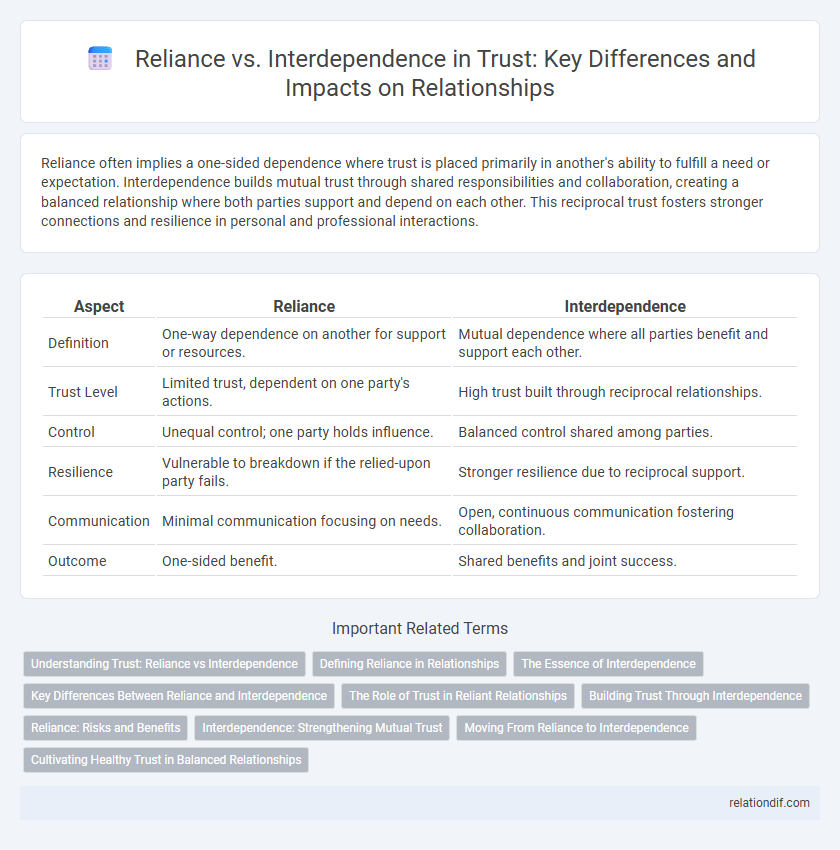Reliance often implies a one-sided dependence where trust is placed primarily in another's ability to fulfill a need or expectation. Interdependence builds mutual trust through shared responsibilities and collaboration, creating a balanced relationship where both parties support and depend on each other. This reciprocal trust fosters stronger connections and resilience in personal and professional interactions.
Table of Comparison
| Aspect | Reliance | Interdependence |
|---|---|---|
| Definition | One-way dependence on another for support or resources. | Mutual dependence where all parties benefit and support each other. |
| Trust Level | Limited trust, dependent on one party's actions. | High trust built through reciprocal relationships. |
| Control | Unequal control; one party holds influence. | Balanced control shared among parties. |
| Resilience | Vulnerable to breakdown if the relied-upon party fails. | Stronger resilience due to reciprocal support. |
| Communication | Minimal communication focusing on needs. | Open, continuous communication fostering collaboration. |
| Outcome | One-sided benefit. | Shared benefits and joint success. |
Understanding Trust: Reliance vs Interdependence
Trust evolves through reliance, where one depends on another's consistency and reliability to fulfill specific needs, fostering predictability in relationships. Interdependence deepens trust by creating mutual vulnerability and collaborative engagement, highlighting a shared commitment to collective goals. Understanding the distinction enhances relationship dynamics and supports sustainable cooperation in personal and professional settings.
Defining Reliance in Relationships
Reliance in relationships refers to depending on others for support, resources, or emotional stability, often creating a one-sided dynamic where one party is more vulnerable. This contrasts with interdependence, which fosters mutual support and shared responsibilities, enhancing balance and trust. Understanding reliance helps clarify boundaries and expectations, ensuring that dependence does not undermine personal autonomy or relational health.
The Essence of Interdependence
Interdependence emphasizes mutual reliance where each party actively depends on the other's contributions, fostering a balanced exchange of trust and cooperation. This dynamic creates a resilient foundation for collaboration, as trust is built through shared goals and reciprocal support. Unlike one-sided reliance, interdependence cultivates a continuous, interactive process that strengthens relationships and promotes collective success.
Key Differences Between Reliance and Interdependence
Reliance involves one party depending on another for support or resources, often creating an imbalance in responsibility and control. In contrast, interdependence signifies a mutual relationship where both parties contribute and benefit equally, fostering collaboration and shared accountability. Understanding these key differences is essential for building trust-based partnerships that promote fairness and long-term cooperation.
The Role of Trust in Reliant Relationships
Reliant relationships depend heavily on trust as the foundation for predictable actions and consistent support, ensuring stability when one party relies on another for critical needs. Trust mitigates risks associated with dependence by fostering confidence in the other party's reliability and integrity, which is essential for long-term commitment. In contrast, interdependence balances mutual trust with shared accountability, creating a dynamic where both parties actively contribute and uphold responsibilities.
Building Trust Through Interdependence
Building trust through interdependence involves fostering mutual reliance where each party consistently supports and complements the other's strengths and weaknesses. Unlike simple reliance, interdependence creates a dynamic of shared responsibility and open communication, enhancing transparency and accountability. This collaborative engagement cultivates deeper trust by aligning goals and encouraging adaptive problem-solving in complex relationships.
Reliance: Risks and Benefits
Reliance involves placing trust in others to perform tasks or fulfill commitments, offering efficiency and focused expertise that can enhance productivity. However, it carries risks such as vulnerability to others' failures, reduced control, and potential dependency that may impair autonomy. Balancing reliance with well-defined expectations and safeguards mitigates these risks while leveraging its benefits for organizational success.
Interdependence: Strengthening Mutual Trust
Interdependence fosters stronger mutual trust by encouraging collaborative problem-solving and shared responsibilities, which deepen relational bonds. This dynamic creates a resilient network where individuals and organizations rely on each other's strengths and expertise, enhancing reliability and commitment. Emphasizing interdependence shifts the focus from mere reliance to a balanced exchange of support, cultivating a foundation of trust essential for long-term success.
Moving From Reliance to Interdependence
Shifting from reliance to interdependence fosters mutual accountability and shared responsibility, strengthening trust within teams and organizations. Unlike reliance, which centers on dependence on others for support or outcomes, interdependence emphasizes collaborative effort where each party actively contributes to collective success. This evolution enhances transparency, communication, and resilience, enabling more sustainable and dynamic partnerships.
Cultivating Healthy Trust in Balanced Relationships
Relying on others often creates vulnerability, while interdependence fosters mutual support and balanced contributions, promoting deeper trust. Healthy trust develops through consistent communication, respect for boundaries, and shared accountability within relationships. Emphasizing interdependence over reliance encourages resilience and sustainable connection based on equality and cooperation.
Reliance vs Interdependence Infographic

 relationdif.com
relationdif.com